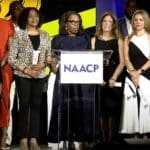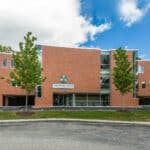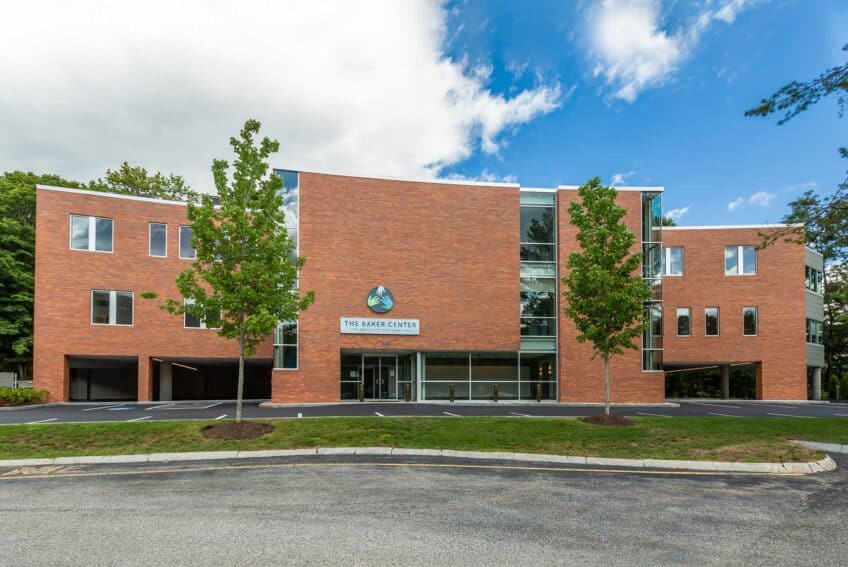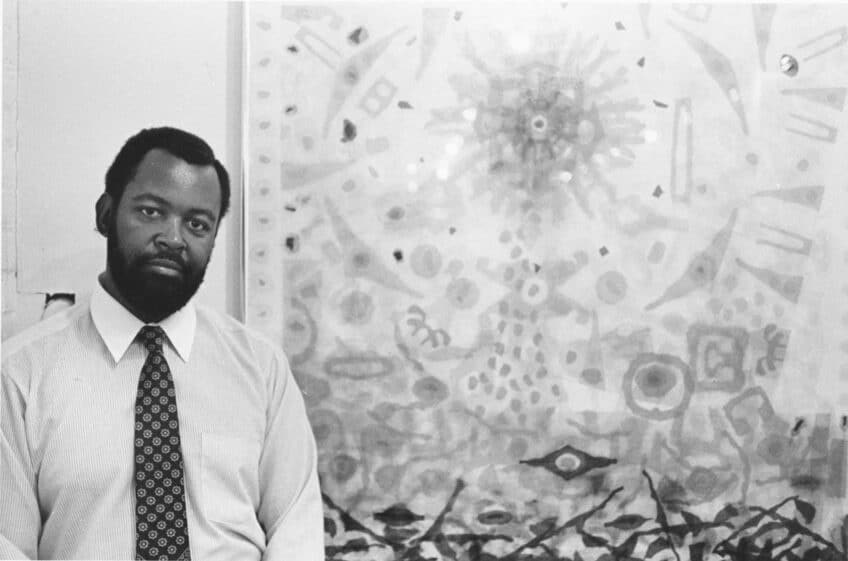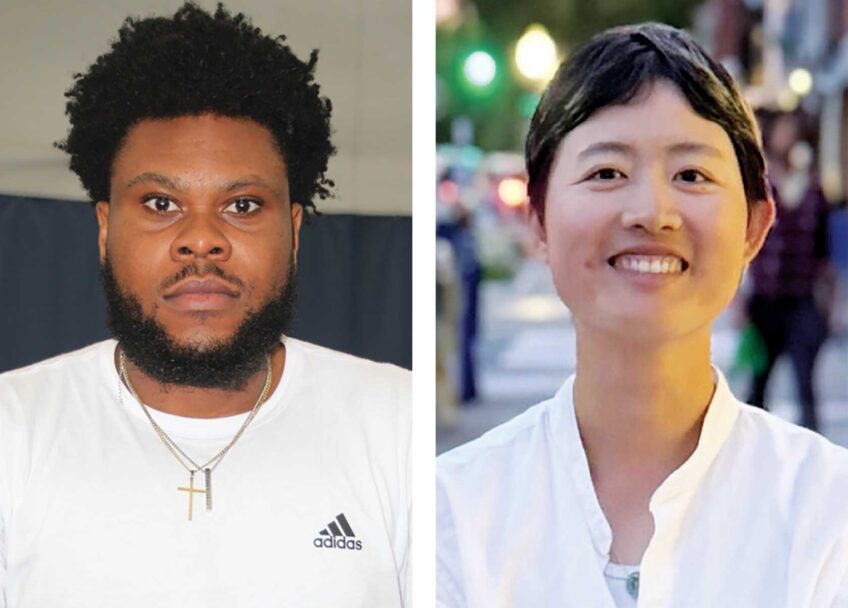At Boston rally, George Floyd’s uncle marks fifth anniversary of the murder that changed America
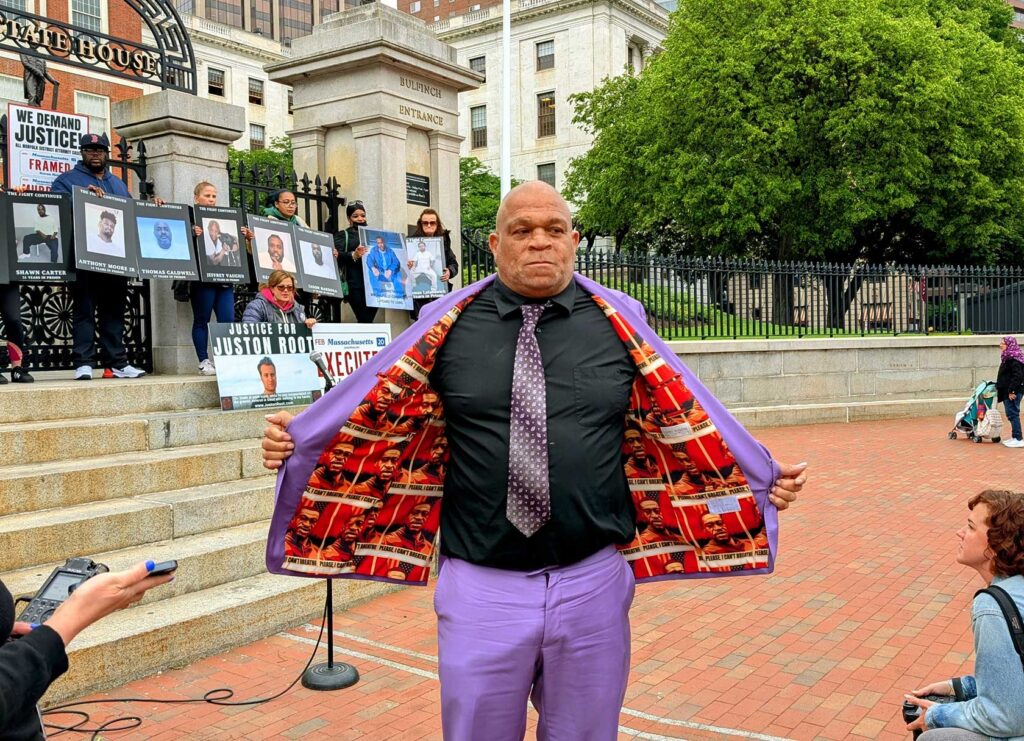
On May 21, Selwyn Jones appeared at a Massachusetts State House press conference and rally to mark the fifth anniversary of the May 25, 2020 murder of his nephew, George Floyd. He hasn’t stopped fighting for justice since that dark day. Floyd’s death also spurred the Black Lives Matter movement’s massive international rallies for justice that led to the convictions of former Minneapolis police officers Derek Chauvin, Tou Thao, Thomas Lane and J. Alexander Kueng.
Jones was joined by cosponsors Lynn Currier of the South Shore-based Skweda Solutions and the families of 16 wrongfully convicted men from Massachusetts who make up part of the Coalition of Judiciary Accountability, which asks for an independent entity, not County DAs, to examine their cases and set up an independent commission on wrongful convictions in Massachusetts.
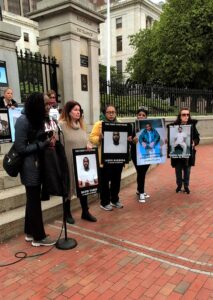
Members of the Coalition of Judiciary Accountability hold posters of their loved ones. PHOTO: SUSIE DAVIDSON
Since his nephew’s death, Jones has co-founded the Justice 929 organization, a nonprofit charity — named for the gruesome number of minutes and seconds that Chauvin’s knee was on Floyd’s neck, back and shoulder that Minneapolis evening — that promotes law reform and civil rights, locates missing persons, works with youth, counters gun violence, and assists those who have been wrongfully convicted. Jones has also helped develop the forthcoming MYTH app, which can record police interactions and transmit panic alerts to emergency contacts.
“There’s been some changes, but it’s not enough,” Jones told the Banner prior to the event. “Every year, innocent people are dying at the hands of police. People are losing their loved ones. It hasn’t stopped. We need to do better.”
We do. Reports that week detailed the ongoing debate on the design of George Floyd Square at the intersection of 38th and Chicago. That very day, the DOJ nixed police reform settlements, called consent decrees, that were agreed upon with Minneapolis and Louisville following the deaths of Floyd and Breonna Taylor. Minneapolis Mayor Jacob Frey issued a statement that in his city the police reforms would continue, despite the DOJ’s motion.
The State House program was coordinated by Currier, a youth advocate, anti-racism activist and founder of Haitkaah Social Justice Project and The Boston Arts Project who holds a psychology degree from Adelphi University and an MFA in Film Production from Boston University.
Speakers included Carla Sheffield from the Better Opportunities support organization and her daughters, Zyariah Sheffield and Nikia Ramsey, who spoke about their son and brother Burrell Ramsey-White, 26, who was shot and killed by Boston police in the South End on August 21, 2012.
“People tried to tarnish his name to reduce him to something he wasn’t. They didn’t know him, not like we did,” Nikia Ramsey said. “Our story is not isolated — it is a reflection of a national crisis.”
She cited the grim stats: “According to Mapping Police Violence, in 2024 alone, police killed 1,247 people in the United States. That’s roughly three people every day, with Black and brown people nearly three times more likely to be killed by the police than white people.” Massachusetts, she said, wasn’t exempt. “We must stop pretending that systemic racism ends at our borders. The trauma lives here.”
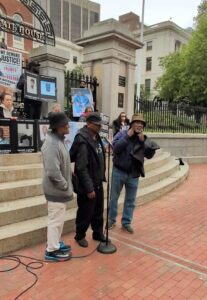
Wrongfully incarcerated prisoners Albert Brown and codefendant Jabir Pope with fellow former prisoner Robert Rose of the singing group The OGs. PHOTO: SUSIE DAVIDSON
“It’s a mystery to me that we can say we’re in the land of the free, the home of the brave, and yet we have to suffer this year after year, long after Medgar Evers,” said Wayne Dozier, grandfather of Dan Roy Henry Jr., known as DJ Henry, who was shot and killed by police in Pleasantville, New York, 15 years ago. “If you look across the street at that relief there (the Robert Gould Shaw and Massachusetts 54th Regiment Memorial), you see Black soldiers fighting in the Civil War. From the Civil War to the Vietnam War to other wars, Black men have stood for this country — to come back and see our children killed.”
Jen Root Bannon, whose brother Juston Root was shot 46 times in February 2020 while he was suffering a mental episode, spoke of the frustration of losing their civil suit due to qualified immunity. “Because they investigated themselves,” she said. “It all started at Brigham and Women’s Hospital, and it escalated every step of the way. It didn’t need to happen, and it shouldn’t have happened.”
Another speaker was Leonna Abraham Brandao of Randolph, whose New Vision Organization, Inc. is an advocate for Massachusetts incarcerated first-time offenders serving Life and Life without Parole. “We have an epidemic in this country of mental illnesses and addiction,” said Brandao. “They’re using the prisons to house these people. We have a high rate of suicide.”
Hank Houghton of West Brookfield gave emotional remarks about his 44 years in prison, during which his entire family died, and his 12-year-old daughter was killed by a drunk driver, before DNA testing cleared him of a wrongful rape charge three years ago. A Vietnam veteran, he was already under stress.
“There was a sentiment against returning soldiers,” Houghton told this reporter after the rally. “We were told before we left Vietnam not to wear our uniforms home.” And he had plenty to say about the so-called DOC. “It isn’t the Department of Corrections, but when the staff sees you trying to self-correct and better yourself, they oppose it,” he said. “They want to see you come back because we are their guaranteed paycheck.”
In prison, Houghton co-founded Vietnam Veterans in Prison in Walpole, and after his release on Dec. 31, 2021, he began volunteering with the Open Sky Community Compass Center in Worcester, Project Youth at MCI Norfolk, and has spoken at UMass Chan Medical School about drug and alcohol abuse, the criminal system, prison life and his post-prison life, which has also involved volunteering at the Recovery Center of HOPE in Ware and a criminal justice organization in Springfield.
He is a member of the Parole Review for All, which aims to eliminate all life sentences in Massachusetts.
Also holding up a poster and speaking was Jonathan Tetherly of Chicopee, a retired UCC Minister, author and social justice advocate whose latest book, “What’s Going On In There? A Jail Chaplain’s Story,” details his 30 years as a chaplain at the Hampden County Jail in Ludlow. Tetherly and Houghton are members of First Congregational United Church of Christ in Chicopee. The national body of the UCC has been active in social causes, including support for abortion rights, the United Farm Workers and the Wilmington Ten.
Jabir Pope, who spent 38 wrongful years in prison and was the subject of an Emmy-winning Boston Globe story, said the damage to his life and that of his family was irreparable. But while imprisoned, he resurrected a singing group called the OGs, for Original Gentlemen, that he had begun years before with longtime best friend and co-defendant Albert Brown, as well as Robert Rose, who was incarcerated with them for 20 years. At the State House, the three men then sang their song “Freedom,” as the TV cameras moved up. Pope said the song was about the things that might enslave a person — be they drugs, alcohol, anything that holds one back from being their best.
Twenty-year inmate Devon McNeil told the crowd about finding a father figure he never had while imprisoned. “Today, five years home, I’m the founder of Not on My Watch Mentoring Incorporated,” he said, “and I mentor about 20 youth in the inner city.” He recently signed a lease on a 2,000 square foot building at 314 Bowdoin and Quincy Street that now houses his nonprofit.
“I was what they call an impact player in my neighborhood,” said McNeil. “Now I’m making an impact in my community, in a positive way.” He’s written two books: “The Streets Lied and We Believed,” and “From Negative to Positive in My Own Words.”
“I woke one day, and the world was in chaos because somebody decided that they would take my nephew’s life,” Jones said. “However you want to look at it, it was wrong. The people that are standing behind me that have been incarcerated for 25, 30, 40 years have also been wronged. How do we fix this? We fix this by fighting. You know, without a fight, you can’t win a war,” he said. “Why wouldn’t I come to Boston?” he asked, with an aside that it was colder in Boston than in South Dakota, where he lives. “I came here to support all the brothers on these posters. And how many George Floyds are there?”
During the Boston rally, schoolchildren cheered and waved from a passing bus, as did a city public works driver from his van. Clearly, justice is both in process and on the minds of Americans of all ages. And Jones may have had a big part in advancing this transformation, but no one knows more than he that there’s far too much yet to be done. And so, he was soon off to his next stop, Minneapolis.
Susie Davidson has contributed to HuffPost, The Houston Chronicle, Wicked Local and The Jewish Advocate, among other publications. She is the author of “I Refused to Die: Stories of Boston-area Holocaust Survivors and Liberating Soldiers”and is completing “Tracking the Times: A Century of Protest Music.”

